Sang+Yup+Lee
-
 KAIST to Participate in the Summer Davos Forum
KAIST will participate in the 2017 Summer Davos Forum in Dalian, China from June 27 to 29. The Summer Davos Forum with the official title “Annual Meeting of New Champions” is an annual international meeting co-hosted by China and the World Economic Forum (WEF) to address global issues which has been held since 2007.
Focusing on this year’s theme ‘Achieving Inclusive Growth in the Fourth Industrial Revolution,’ science and technology experts from 90 different countries will participate in various sessions to present on and discuss pending global innovative issues. KAIST is to be the only Korean university to run ‘IdeasLab,’ in which researchers will introduce current research trends and discuss ideas with global leaders. This is the sixth year for KAIST to run IdeasLab.
This year’s IdeasLab has the theme ‘Materials of the Future,’ and will include presentations and discussions on materials developed at KAIST which could lead the Fourth Industrial Revolution. President Sung-Chul Shin, the chairman of the session, will first introduce the current status of KAIST and IdeasLab, followed by a presentation of cutting-edge integrated research findings by KAIST professors.
President Shin will also participate in various sessions organized by the Global University Leaders Forum (GULF) as discussion leader. President Shin is the only Korean member of GULF, a community comprised of the presidents of the world’s top 27 universities. Other members include the presidents of the University of Oxford and the University of Cambridge in the U.K., MIT, Harvard, Stanford, and Columbia Universities in the US, and the University of Tokyo in Japan.
Further, President Shin will participate in a strategy session for inclusive growth in the era of the Fourth Industrial Revolution and a meeting with the WEF directors.
The Dean of KAIST Institutes, Distinguished Professor Sang Yup Lee from the Chemical and Biomolecular Engineering Department, who has been invited to the Davos Forum and Summer Davos Forum for the last 15 years, is to present in the ‘Future of Life: Medicine’ session to introduce advancements in traditional medicine through systems biology such as his research on microbiomes (gut microbes).
Professor Lee, as the chair of the Global Future Council on Biotechnology at the WEF, and committee member of the Annual Meeting of the Global Future Councils on the Fourth Industrial Revolution, is to participate in various bio-sessions and the Fourth Industrial Revolution banquet session to lead the discussions.
President Shin said, “KAIST has been sharing global research findings with global leaders through IdeasLab at the Davos Forum for the past six years and it has always been well received.” He continued, “The forum will be the place for in-depth discussion on the technological changes that accompany the Fourth Industrial Revolution and human-centered development plan, as well as introducing innovative research and integrated research findings from KAIST.”
This year’s speakers include Li Keqiang, the current Premier of the State Council of China; Guo Ping, the rotating C.E.O. of Huawei; and Ya-Qin Zhang, the President of Baidu, a company leading technological innovation in various fields such as robotics and autonomous vehicles. Two thousand distinguished guests in politics, administration, finance, and academia from 90 countries are to participate in the meeting.
2017.06.21 View 10186
KAIST to Participate in the Summer Davos Forum
KAIST will participate in the 2017 Summer Davos Forum in Dalian, China from June 27 to 29. The Summer Davos Forum with the official title “Annual Meeting of New Champions” is an annual international meeting co-hosted by China and the World Economic Forum (WEF) to address global issues which has been held since 2007.
Focusing on this year’s theme ‘Achieving Inclusive Growth in the Fourth Industrial Revolution,’ science and technology experts from 90 different countries will participate in various sessions to present on and discuss pending global innovative issues. KAIST is to be the only Korean university to run ‘IdeasLab,’ in which researchers will introduce current research trends and discuss ideas with global leaders. This is the sixth year for KAIST to run IdeasLab.
This year’s IdeasLab has the theme ‘Materials of the Future,’ and will include presentations and discussions on materials developed at KAIST which could lead the Fourth Industrial Revolution. President Sung-Chul Shin, the chairman of the session, will first introduce the current status of KAIST and IdeasLab, followed by a presentation of cutting-edge integrated research findings by KAIST professors.
President Shin will also participate in various sessions organized by the Global University Leaders Forum (GULF) as discussion leader. President Shin is the only Korean member of GULF, a community comprised of the presidents of the world’s top 27 universities. Other members include the presidents of the University of Oxford and the University of Cambridge in the U.K., MIT, Harvard, Stanford, and Columbia Universities in the US, and the University of Tokyo in Japan.
Further, President Shin will participate in a strategy session for inclusive growth in the era of the Fourth Industrial Revolution and a meeting with the WEF directors.
The Dean of KAIST Institutes, Distinguished Professor Sang Yup Lee from the Chemical and Biomolecular Engineering Department, who has been invited to the Davos Forum and Summer Davos Forum for the last 15 years, is to present in the ‘Future of Life: Medicine’ session to introduce advancements in traditional medicine through systems biology such as his research on microbiomes (gut microbes).
Professor Lee, as the chair of the Global Future Council on Biotechnology at the WEF, and committee member of the Annual Meeting of the Global Future Councils on the Fourth Industrial Revolution, is to participate in various bio-sessions and the Fourth Industrial Revolution banquet session to lead the discussions.
President Shin said, “KAIST has been sharing global research findings with global leaders through IdeasLab at the Davos Forum for the past six years and it has always been well received.” He continued, “The forum will be the place for in-depth discussion on the technological changes that accompany the Fourth Industrial Revolution and human-centered development plan, as well as introducing innovative research and integrated research findings from KAIST.”
This year’s speakers include Li Keqiang, the current Premier of the State Council of China; Guo Ping, the rotating C.E.O. of Huawei; and Ya-Qin Zhang, the President of Baidu, a company leading technological innovation in various fields such as robotics and autonomous vehicles. Two thousand distinguished guests in politics, administration, finance, and academia from 90 countries are to participate in the meeting.
2017.06.21 View 10186 -
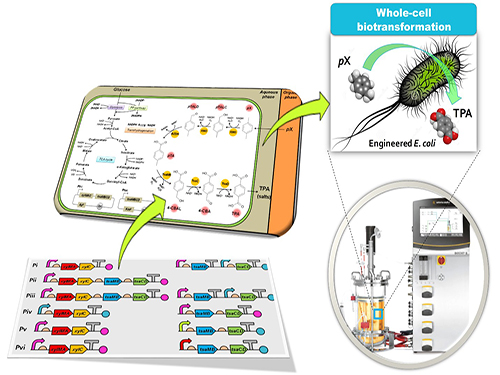 Bio-based p-Xylene Oxidation into Terephthalic Acid by Engineered E.coli
KAIST researchers have established an efficient biocatalytic system to produce terephthalic acid (TPA) from p-xylene (pX). It will allow this industrially important bulk chemical to be made available in a more environmentally-friendly manner.
The research team developed metabolically engineered Escherichia coli (E.coli) to biologically transform pX into TPA, a chemical necessary in the manufacturing of polyethylene terephthalate (PET). This biocatalysis system represents a greener and more efficient alternative to the traditional chemical methods for TPA production. This research, headed by Distinguished Professor Sang Yup Lee, was published in Nature Communications on May 31.
The research team utilized a metabolic engineering and synthetic biology approach to develop a recombinant microorganism that can oxidize pX into TPA using microbial fermentation. TPA is a globally important chemical commodity for manufacturing PET. It can be applied to manufacture plastic bottles, clothing fibers, films, and many other products. Currently, TPA is produced from pX oxidation through an industrially well-known chemical process (with a typical TPA yield of over 95 mol%), which shows, however, such drawbacks as intensive energy requirements at high temperatures and pressure, usage of heavy metal catalysts, and the unavoidable byproduct formation of 4-carboxybenzaldehyde.
The research team designed and constructed a synthetic metabolic pathway by incorporating the upper xylene degradation pathway of Pseudomonas putida F1 and the lower p-toluene sulfonate pathway of Comamonas testosteroni T-2, which successfully produced TPA from pX in small-scale cultures, with the formation of p-toluate (pTA) as the major byproduct. The team further optimized the pathway gene expression levels by using a synthetic biology toolkit, which gave the final engineered E. coli strain showing increased TPA production and the complete elimination of the byproduct.
Using this best-performing strain, the team designed an elegant two-phase (aqueous/organic) fermentation system for TPA production on a larger scale, where pX was supplied in the organic phase. Through a number of optimization steps, the team ultimately achieved production of 13.3 g TPA from 8.8 g pX, which represented an extraordinary yield of 97 mol%.
The team has developed a microbial biotechnology application which is reportedly the first successful example of the bio-based production of TPA from pX by the microbial fermentation of engineered E. coli. This bio-based TPA technology presents several advantages such as ambient reaction temperature and pressure, no use of heavy metals or other toxic chemicals, the removable of byproduct formation, and it is 100% environmentally compatible.
Professor Lee said, “We presented promising biotechnology for producing large amounts of the commodity chemical TPA, which is used for PET manufacturing, through metabolically engineered gut bacterium. Our research is meaningful in that it demonstrates the feasibility of the biotechnological production of bulk chemicals, and if reproducible when up-scaled, it will represent a breakthrough in hydrocarbon bioconversions.”
Ph.D. candidate Zi Wei Luo is the first author of this research (DOI:10.1038/ncomms15689).The research was supported by the Intelligent Synthetic Biology Center through the Global Frontier Project (2011-0031963) of the Ministry of Science, ICT & Future Planning through the National Research Foundation of Korea.
Figure: Biotransformation of pX into TPA by engineered E. coli.
This schematic diagram shows the overall conceptualization of how metabolically engineered E. coli produced TPA from pX. The engineered E. coli was developed through reconstituting a synthetic metabolic pathway for pX conversion to TPA and optimized for increased TPA yield and byproduct elimination. Two-phase partitioning fermentation system was developed for demonstrating the feasibility of large-scale production of TPA from pX using the engineered E. coli strains, where pX was supplied in the organic phase and TPA was produced in the aqueous phase.
2017.06.05 View 12861
Bio-based p-Xylene Oxidation into Terephthalic Acid by Engineered E.coli
KAIST researchers have established an efficient biocatalytic system to produce terephthalic acid (TPA) from p-xylene (pX). It will allow this industrially important bulk chemical to be made available in a more environmentally-friendly manner.
The research team developed metabolically engineered Escherichia coli (E.coli) to biologically transform pX into TPA, a chemical necessary in the manufacturing of polyethylene terephthalate (PET). This biocatalysis system represents a greener and more efficient alternative to the traditional chemical methods for TPA production. This research, headed by Distinguished Professor Sang Yup Lee, was published in Nature Communications on May 31.
The research team utilized a metabolic engineering and synthetic biology approach to develop a recombinant microorganism that can oxidize pX into TPA using microbial fermentation. TPA is a globally important chemical commodity for manufacturing PET. It can be applied to manufacture plastic bottles, clothing fibers, films, and many other products. Currently, TPA is produced from pX oxidation through an industrially well-known chemical process (with a typical TPA yield of over 95 mol%), which shows, however, such drawbacks as intensive energy requirements at high temperatures and pressure, usage of heavy metal catalysts, and the unavoidable byproduct formation of 4-carboxybenzaldehyde.
The research team designed and constructed a synthetic metabolic pathway by incorporating the upper xylene degradation pathway of Pseudomonas putida F1 and the lower p-toluene sulfonate pathway of Comamonas testosteroni T-2, which successfully produced TPA from pX in small-scale cultures, with the formation of p-toluate (pTA) as the major byproduct. The team further optimized the pathway gene expression levels by using a synthetic biology toolkit, which gave the final engineered E. coli strain showing increased TPA production and the complete elimination of the byproduct.
Using this best-performing strain, the team designed an elegant two-phase (aqueous/organic) fermentation system for TPA production on a larger scale, where pX was supplied in the organic phase. Through a number of optimization steps, the team ultimately achieved production of 13.3 g TPA from 8.8 g pX, which represented an extraordinary yield of 97 mol%.
The team has developed a microbial biotechnology application which is reportedly the first successful example of the bio-based production of TPA from pX by the microbial fermentation of engineered E. coli. This bio-based TPA technology presents several advantages such as ambient reaction temperature and pressure, no use of heavy metals or other toxic chemicals, the removable of byproduct formation, and it is 100% environmentally compatible.
Professor Lee said, “We presented promising biotechnology for producing large amounts of the commodity chemical TPA, which is used for PET manufacturing, through metabolically engineered gut bacterium. Our research is meaningful in that it demonstrates the feasibility of the biotechnological production of bulk chemicals, and if reproducible when up-scaled, it will represent a breakthrough in hydrocarbon bioconversions.”
Ph.D. candidate Zi Wei Luo is the first author of this research (DOI:10.1038/ncomms15689).The research was supported by the Intelligent Synthetic Biology Center through the Global Frontier Project (2011-0031963) of the Ministry of Science, ICT & Future Planning through the National Research Foundation of Korea.
Figure: Biotransformation of pX into TPA by engineered E. coli.
This schematic diagram shows the overall conceptualization of how metabolically engineered E. coli produced TPA from pX. The engineered E. coli was developed through reconstituting a synthetic metabolic pathway for pX conversion to TPA and optimized for increased TPA yield and byproduct elimination. Two-phase partitioning fermentation system was developed for demonstrating the feasibility of large-scale production of TPA from pX using the engineered E. coli strains, where pX was supplied in the organic phase and TPA was produced in the aqueous phase.
2017.06.05 View 12861 -
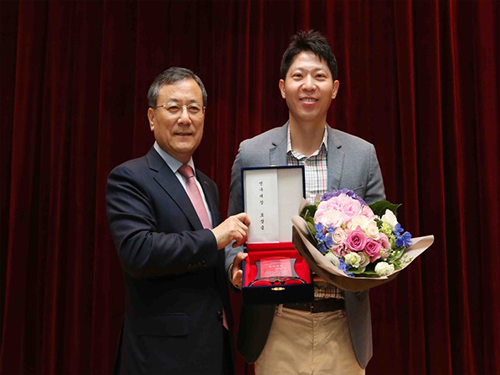 2017 KAIST Research Day Honors Professor Hoon Sohn
The 2017 KAIST Research Day recognized Professor Hoon Sohn of the Department of Civil and Environmental Engineering as Research Grand Prize Awardee in addition to the 10 most distinguished research achievements of the past year.
The Research Grand Prize recognizes the professor whose comprehensive research performance evaluation indicator is the highest over the past five years. The indicator combines the factors of the number of research contracts, IPR, royalty income, as well as research overhead cost inclusion.
During the ceremony, which was held on May 23, Professor Jun-Ho Oh of the Department of Mechanical Engineering and Professor Sang Yup Lee of the Department of Chemical and Biomolecular Engineering also won the Best Research Award. The two professors had the best scores when evaluating their research performance for one-year periods.
Meanwhile, the Research Innovation Award went to Professor YongKeun Park of the Department of Physics. The Research Innovation Award scores the factors of foreign patent registration, contracts of technological transfer and income from technology fees, technology consultations, and startups and selected Professor Park as the top winner.
Professors Yong Hee Lee of the Department of Physics and Jonghwa Shin of the Department of Material Science won the Convergence Research Award. The Convergence Research Award recognizes the most outstanding research team who created innovative research results for a year.
After the ceremony, President Chen Shiyi of the Southern University of Science and Technology gave a distinguished lecture on the “Global & Entrepreneurial Universities for the Age of the Fourth Industrial Revolution.” the Research Day ceremony, KAIST also presented the ten most distinguished research achievements made by KAIST professors during the last year as follows (Click):
▲ Commercialization of 3D Holographic Microscopy by Professor YongKeun Park of the Department of Physics
▲ Designer Proteins with Chemical Modifications by Professor Hee-Sung Park of the Department of Chemistry
▲ Lanthanum-Catalyzed Synthesis of Microporous 3D Graphene-Like Carbons in a Zeolite Template by Professor Ryong Ryoo of the Department of Chemistry
▲ Complete Prevention of Blood Loss by Self-Sealing Hemostatic Needles by Professor Haeshin Lee of the Department of Chemistry
▲ An Immunological Mechanism for the Contribution of Commensal Microbiota Against Herpes Simplex Virus Infection in Genital Mucosa by Heung Kyu Lee of the Graduate School of Medical Science and Engineering
▲ Development of a Pulse-Echo Laser Ultrasonic Propagation Imaging System by Professor Jung-Ryul Lee of the Department of Aerospace Engineering
▲ Bi-refractive Stereo Imaging for Single-Shot Depth Acquisition by Professor Min H. Kim of the School of Computing
▲ Development of Environment Friendly Geotechnical Construction Material Using Biopolymer by Professor Gye-Chun Cho of the Department of Civil and Environmental Engineering
▲ Protein Delivery Via Engineered Exosomes by Professor Chulhee Choi of the Department of Bio and Brain Engineering
▲ Hot Electron Detection Under Catalytic Reactions by Professor Jeong Young Park of the Graduate School of EEWS.
After the ceremony, President Chen Shiyi of the Southern University of Science and Technology gave a distinguished lecture on the “Global & Entrepreneurial Universities for the Age of the Fourth Industrial Revolution.”
(Photo:President Shin poses with the 2017 KAIST Research Grand Prize Winner Professor Hoon Sohn on May 23.)
2017.05.23 View 15705
2017 KAIST Research Day Honors Professor Hoon Sohn
The 2017 KAIST Research Day recognized Professor Hoon Sohn of the Department of Civil and Environmental Engineering as Research Grand Prize Awardee in addition to the 10 most distinguished research achievements of the past year.
The Research Grand Prize recognizes the professor whose comprehensive research performance evaluation indicator is the highest over the past five years. The indicator combines the factors of the number of research contracts, IPR, royalty income, as well as research overhead cost inclusion.
During the ceremony, which was held on May 23, Professor Jun-Ho Oh of the Department of Mechanical Engineering and Professor Sang Yup Lee of the Department of Chemical and Biomolecular Engineering also won the Best Research Award. The two professors had the best scores when evaluating their research performance for one-year periods.
Meanwhile, the Research Innovation Award went to Professor YongKeun Park of the Department of Physics. The Research Innovation Award scores the factors of foreign patent registration, contracts of technological transfer and income from technology fees, technology consultations, and startups and selected Professor Park as the top winner.
Professors Yong Hee Lee of the Department of Physics and Jonghwa Shin of the Department of Material Science won the Convergence Research Award. The Convergence Research Award recognizes the most outstanding research team who created innovative research results for a year.
After the ceremony, President Chen Shiyi of the Southern University of Science and Technology gave a distinguished lecture on the “Global & Entrepreneurial Universities for the Age of the Fourth Industrial Revolution.” the Research Day ceremony, KAIST also presented the ten most distinguished research achievements made by KAIST professors during the last year as follows (Click):
▲ Commercialization of 3D Holographic Microscopy by Professor YongKeun Park of the Department of Physics
▲ Designer Proteins with Chemical Modifications by Professor Hee-Sung Park of the Department of Chemistry
▲ Lanthanum-Catalyzed Synthesis of Microporous 3D Graphene-Like Carbons in a Zeolite Template by Professor Ryong Ryoo of the Department of Chemistry
▲ Complete Prevention of Blood Loss by Self-Sealing Hemostatic Needles by Professor Haeshin Lee of the Department of Chemistry
▲ An Immunological Mechanism for the Contribution of Commensal Microbiota Against Herpes Simplex Virus Infection in Genital Mucosa by Heung Kyu Lee of the Graduate School of Medical Science and Engineering
▲ Development of a Pulse-Echo Laser Ultrasonic Propagation Imaging System by Professor Jung-Ryul Lee of the Department of Aerospace Engineering
▲ Bi-refractive Stereo Imaging for Single-Shot Depth Acquisition by Professor Min H. Kim of the School of Computing
▲ Development of Environment Friendly Geotechnical Construction Material Using Biopolymer by Professor Gye-Chun Cho of the Department of Civil and Environmental Engineering
▲ Protein Delivery Via Engineered Exosomes by Professor Chulhee Choi of the Department of Bio and Brain Engineering
▲ Hot Electron Detection Under Catalytic Reactions by Professor Jeong Young Park of the Graduate School of EEWS.
After the ceremony, President Chen Shiyi of the Southern University of Science and Technology gave a distinguished lecture on the “Global & Entrepreneurial Universities for the Age of the Fourth Industrial Revolution.”
(Photo:President Shin poses with the 2017 KAIST Research Grand Prize Winner Professor Hoon Sohn on May 23.)
2017.05.23 View 15705 -
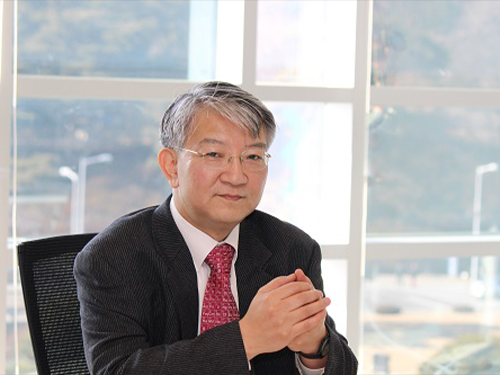 Distinguished Professor Lee Elected to the NAS
Distinguished Professor Sang Yup Lee of the Department of Chemical and Biomolecular Engineering was elected as a foreign associate to the US National Academy of Sciences (NAS) on May 2. The National Academy of Sciences elected 84 new members and 21 foreign associates in recognition of their distinguished and continuing achievements in their original research. Election to the Academy is widely regarded as one of the highest honors that a scientist can receive.
Professor Lee was also elected in 2010 as a member of the US National Academy of Engineering (NAE) for his leadership in microbial biotechnology and metabolic engineering, including the development of fermentation processes for biodegradable polymers and organic acids. Until 2016, there are only 12 people worldwide who are foreign associates of both NAS and NAE.
He is the first Korean elected to both prestigious academies, the NAS and the NAE in the US. Professor Lee is currently the dean of KAIST Institutes, the world leading institute for multi-and interdisciplinary research. He is also serving as co-chair of the Global Council on Biotechnology and member of the Global Future Council on the Fourth Industrial Revolution, the World Economic Forum.
2017.05.16 View 11290
Distinguished Professor Lee Elected to the NAS
Distinguished Professor Sang Yup Lee of the Department of Chemical and Biomolecular Engineering was elected as a foreign associate to the US National Academy of Sciences (NAS) on May 2. The National Academy of Sciences elected 84 new members and 21 foreign associates in recognition of their distinguished and continuing achievements in their original research. Election to the Academy is widely regarded as one of the highest honors that a scientist can receive.
Professor Lee was also elected in 2010 as a member of the US National Academy of Engineering (NAE) for his leadership in microbial biotechnology and metabolic engineering, including the development of fermentation processes for biodegradable polymers and organic acids. Until 2016, there are only 12 people worldwide who are foreign associates of both NAS and NAE.
He is the first Korean elected to both prestigious academies, the NAS and the NAE in the US. Professor Lee is currently the dean of KAIST Institutes, the world leading institute for multi-and interdisciplinary research. He is also serving as co-chair of the Global Council on Biotechnology and member of the Global Future Council on the Fourth Industrial Revolution, the World Economic Forum.
2017.05.16 View 11290 -
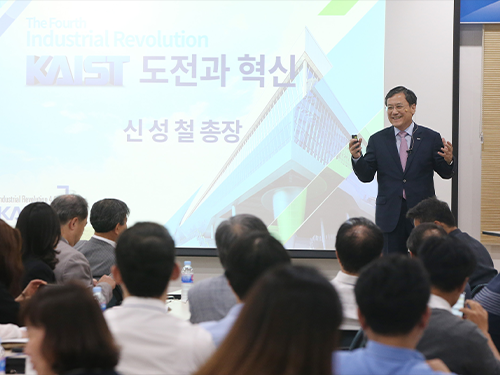 Policy Debate Series for Industry 4.0
(Photo caption: President Shin takes the podium as the first speaker of a year-long monthly policy dabate series on Industry 4.0 on May 11.)
KAIST will kick off a monthly policy debate series on Industry 4.0 every Thursday from May 11 at the Startup KAIST building. The year-long series, featuring professors from key technology fields associated with Industry 4.0, is designed to help policy makers from government, industry, and research institutes respond better to the ramifications that Industry 4.0 brings about in each sector.
The series will help them establish the vision and strategy that will work for the new industrial environment to take the lead in the new industrial era.
Twelve professors, including President Sung-Chul Shin, from departments that are researching emerging technologies will speak on the megatrend of new technology, while facilitating debates and Q& A sessions with participants.
The participants will include officials from the government complexes in Sejong and Daejeon cities, government-funded research institutes in Daejeon, and businessmen, among others. For registration, please go to https://startup.kaist.ac.kr/register.
Schedule
Speaker
Theme
May 11
President Sung-Chul Shin
Challenges and Innovations of KAIST in the Era of Industry 4.0
June 8
Professor Jonghwan Kim
Machine Intelligence and Deep Learning
July 6
Professor Jun Ho Oh
Robot Technology and the Future
Aug. 3
Professor Hyunchul Shim
Unmanned Vehicle Technology and Industry 4.0
Sept. 7
Professor Hawoong Jeong
Complex Systems and Data Science
Oct. 12
Professor Yongdae Kim
Technology, Policy, and the Fostering of Talents: Industry 4.0 and Information Protection
Nov. 9
Professor Sang Yup Lee
The Role of Biotechnology in Industry 4.0
Dec. 7
Professor Meeyoung Cha
AI-Based Research for Fake News Detection
2018 Jan. 4
Professor Joungho Kim
Innovation for the Korean Semiconductor Industry: Kim’s Law
Feb. 8
Professor Jaekyun Moon
Education for Industry 4.0
March 8
Professor Sang Kil Cha
Artificial Intelligence Cyber Warfare: Its Present and Future
April 5
Professor Jaeseung Jeong
The Future of Brain Engineering and Artificial Intelligence
2017.05.08 View 11940
Policy Debate Series for Industry 4.0
(Photo caption: President Shin takes the podium as the first speaker of a year-long monthly policy dabate series on Industry 4.0 on May 11.)
KAIST will kick off a monthly policy debate series on Industry 4.0 every Thursday from May 11 at the Startup KAIST building. The year-long series, featuring professors from key technology fields associated with Industry 4.0, is designed to help policy makers from government, industry, and research institutes respond better to the ramifications that Industry 4.0 brings about in each sector.
The series will help them establish the vision and strategy that will work for the new industrial environment to take the lead in the new industrial era.
Twelve professors, including President Sung-Chul Shin, from departments that are researching emerging technologies will speak on the megatrend of new technology, while facilitating debates and Q& A sessions with participants.
The participants will include officials from the government complexes in Sejong and Daejeon cities, government-funded research institutes in Daejeon, and businessmen, among others. For registration, please go to https://startup.kaist.ac.kr/register.
Schedule
Speaker
Theme
May 11
President Sung-Chul Shin
Challenges and Innovations of KAIST in the Era of Industry 4.0
June 8
Professor Jonghwan Kim
Machine Intelligence and Deep Learning
July 6
Professor Jun Ho Oh
Robot Technology and the Future
Aug. 3
Professor Hyunchul Shim
Unmanned Vehicle Technology and Industry 4.0
Sept. 7
Professor Hawoong Jeong
Complex Systems and Data Science
Oct. 12
Professor Yongdae Kim
Technology, Policy, and the Fostering of Talents: Industry 4.0 and Information Protection
Nov. 9
Professor Sang Yup Lee
The Role of Biotechnology in Industry 4.0
Dec. 7
Professor Meeyoung Cha
AI-Based Research for Fake News Detection
2018 Jan. 4
Professor Joungho Kim
Innovation for the Korean Semiconductor Industry: Kim’s Law
Feb. 8
Professor Jaekyun Moon
Education for Industry 4.0
March 8
Professor Sang Kil Cha
Artificial Intelligence Cyber Warfare: Its Present and Future
April 5
Professor Jaeseung Jeong
The Future of Brain Engineering and Artificial Intelligence
2017.05.08 View 11940 -
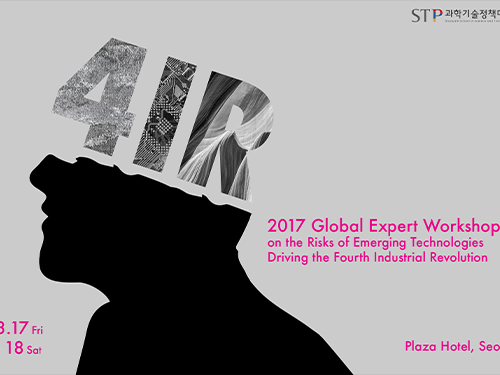 Global Workshop on the Risks of Emerging Technologies
The Center for Science, Policy and Society (CSPS) at the Graduate School of Science and Technology Policy of KAIST will host the 2017 Global Expert Workshop on the Risks of Emerging Technologies Driving the Fourth Industrial Revolution March 17-18 at the Plaza Hotel in Seoul.
At the workshop, experts from public and private sectors at home and abroad will address the socio-economic impacts and implications of the emergence of new technologies that the Fourth Industrial Revolution will bring about. The workshop will be hosted in collaboration with the World Economic Forum’s Global Future Council (GFC) on Technology, Values and Policy. The World Economic Forum’s network of GFCs is the world’s foremost interdisciplinary knowledge network dedicated to promoting innovative thinking about the future.
Four keynote speakers, including Professor Wendell Wallach of the Interdisciplinary Center for Bioethics at Yale University and Dean of the School of Public Policy and Management at Tsinghua University Lan Xue, will deliver speeches. Professor Wallach is the leader of an AI/Robotics Global Governance Project sponsored by the World Economic Forum and will make a speech entitled “Build the Global Infrastructure to Make Sure that AI and Robotics Will Be Beneficial.” Dean Xue, a member of the World Economic Forum’s GFC on Tech, Values, and Policy, is well known for his analysis of the social implications of the risks brought about by emerging technologies. He will speak on “Global Risk Governance of Disruptive 4IR Technologies.”
More than thirty experts will participate in the workshop. Speakers include the KAIST Vice President for Planning and Budget Soohyun Kim, Dean of KAIST Institute San Yup Lee, Professor Jaeseung Jeong of the Department of Bio and Brain Engineering at KAIST, Dr. Sung Chul Kang of the KIST Healthcare Robotics Research Group, and Korea Evaluation Institute of Industrial Technology Program Director Kyong Hoon Kim.
The CSPS of KAIST will continue to make collaborative research efforts with the GFC for developing new insights and perspectives on key global systems as well as study the impact and governance of key emerging technologies.
2017.03.16 View 11708
Global Workshop on the Risks of Emerging Technologies
The Center for Science, Policy and Society (CSPS) at the Graduate School of Science and Technology Policy of KAIST will host the 2017 Global Expert Workshop on the Risks of Emerging Technologies Driving the Fourth Industrial Revolution March 17-18 at the Plaza Hotel in Seoul.
At the workshop, experts from public and private sectors at home and abroad will address the socio-economic impacts and implications of the emergence of new technologies that the Fourth Industrial Revolution will bring about. The workshop will be hosted in collaboration with the World Economic Forum’s Global Future Council (GFC) on Technology, Values and Policy. The World Economic Forum’s network of GFCs is the world’s foremost interdisciplinary knowledge network dedicated to promoting innovative thinking about the future.
Four keynote speakers, including Professor Wendell Wallach of the Interdisciplinary Center for Bioethics at Yale University and Dean of the School of Public Policy and Management at Tsinghua University Lan Xue, will deliver speeches. Professor Wallach is the leader of an AI/Robotics Global Governance Project sponsored by the World Economic Forum and will make a speech entitled “Build the Global Infrastructure to Make Sure that AI and Robotics Will Be Beneficial.” Dean Xue, a member of the World Economic Forum’s GFC on Tech, Values, and Policy, is well known for his analysis of the social implications of the risks brought about by emerging technologies. He will speak on “Global Risk Governance of Disruptive 4IR Technologies.”
More than thirty experts will participate in the workshop. Speakers include the KAIST Vice President for Planning and Budget Soohyun Kim, Dean of KAIST Institute San Yup Lee, Professor Jaeseung Jeong of the Department of Bio and Brain Engineering at KAIST, Dr. Sung Chul Kang of the KIST Healthcare Robotics Research Group, and Korea Evaluation Institute of Industrial Technology Program Director Kyong Hoon Kim.
The CSPS of KAIST will continue to make collaborative research efforts with the GFC for developing new insights and perspectives on key global systems as well as study the impact and governance of key emerging technologies.
2017.03.16 View 11708 -
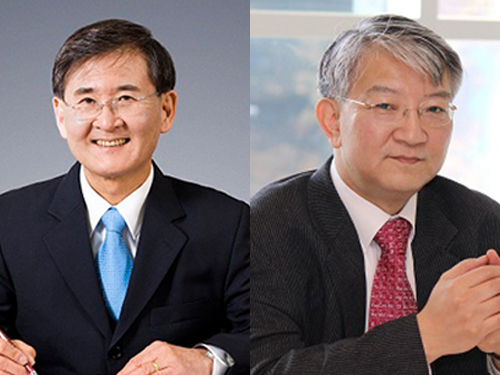 KAIST to Participate in the 2017 Davos Forum
(President Sung-Mo Kang and Distinguished Professor Sang Yup Lee)
KAIST representatives will join high profile, multi-stakeholder dialogues with global leaders across the world to discuss higher education, science, and technological innovation.
KAIST President Sung-Mo Kang and Distinguished Professor Sang Yup Lee of the Chemical and Biomolecular Engineering Department will participate in the World Economic Forum’s (WEF) Annual Meeting on January 17-20, 2017, in Davos-Klosters, Switzerland.
To be held under the theme “Responsive and Responsible Leadership,” the Annual Meeting will offer global leaders from government, business, academia, and civil society a highly interactive platform to address some of the most pressing issues facing the world today, from climate change, economic inequality, to the Fourth Industrial Revolution and its impact on future employment.
On January 18, President Kang will participate in the Global University Leaders Forum, a community of top 26 universities invited from around the world, and will discuss the relevance of higher education in the context of the Fourth Industrial Revolution. He will also share KAIST’s experiences in developing innovative initiatives to bring future-oriented and creative values into its educational and research programs.
On January 19, at the Global Future Council on Production, President Kang will speak about new technologies taking place in traditional production and distribution systems as introduced by the emergence of rapidly evolving technological advancements, and present KAIST’s endeavors to transform those changes into opportunities.
With an eminent group of scientists, including the Director of the US National Science Foundation France A. Córdova and the Editor-in-Chief Philip Campbell of Nature at the Global Science Outlook session, on January 20, President Kang will discuss key challenges for the global science agenda in the year ahead and examine the role of science in formulating public discussions and polices that will have great impact on society and the lives of people.
Currently, Professor Lee is the founding Co-Chair of the WEF’s Global Future Council, an interdisciplinary knowledge network dedicated to promoting innovative thinking on the future. On January 20, he will share his insights at an independent session entitled “World Changing Technology: Biotech and Neurotech,” briefing the audience on the current state of research, development, and commercialization in these fields, as well as explaining how they will contribute to coping with the Fourth Industrial Revolution.
Professor Lee said, “In recent years, we have seen the world become ever more complex, interconnected, and realigned as it is deeply affected by this unprecedented technological innovations, collectively driving the Fourth Industrial Revolution. One pillar of such innovation will take place in biotechnology and neuroscience, which will help us design solutions to many of global problems such as environment, pandemic diseases, aging, healthcare, and previously intractable illnesses.”
President Kang added, “This year’s Davos meeting will focus on the need to foster leadership at the national, regional, and global level to respond collectively with credible actions to issues of major concern for the sustainable and equitable growth, social inclusion, and human development. KAIST has always been a crucial player in these collaborative efforts, and I am happy to share our insights at the upcoming event.”
2017.01.17 View 9982
KAIST to Participate in the 2017 Davos Forum
(President Sung-Mo Kang and Distinguished Professor Sang Yup Lee)
KAIST representatives will join high profile, multi-stakeholder dialogues with global leaders across the world to discuss higher education, science, and technological innovation.
KAIST President Sung-Mo Kang and Distinguished Professor Sang Yup Lee of the Chemical and Biomolecular Engineering Department will participate in the World Economic Forum’s (WEF) Annual Meeting on January 17-20, 2017, in Davos-Klosters, Switzerland.
To be held under the theme “Responsive and Responsible Leadership,” the Annual Meeting will offer global leaders from government, business, academia, and civil society a highly interactive platform to address some of the most pressing issues facing the world today, from climate change, economic inequality, to the Fourth Industrial Revolution and its impact on future employment.
On January 18, President Kang will participate in the Global University Leaders Forum, a community of top 26 universities invited from around the world, and will discuss the relevance of higher education in the context of the Fourth Industrial Revolution. He will also share KAIST’s experiences in developing innovative initiatives to bring future-oriented and creative values into its educational and research programs.
On January 19, at the Global Future Council on Production, President Kang will speak about new technologies taking place in traditional production and distribution systems as introduced by the emergence of rapidly evolving technological advancements, and present KAIST’s endeavors to transform those changes into opportunities.
With an eminent group of scientists, including the Director of the US National Science Foundation France A. Córdova and the Editor-in-Chief Philip Campbell of Nature at the Global Science Outlook session, on January 20, President Kang will discuss key challenges for the global science agenda in the year ahead and examine the role of science in formulating public discussions and polices that will have great impact on society and the lives of people.
Currently, Professor Lee is the founding Co-Chair of the WEF’s Global Future Council, an interdisciplinary knowledge network dedicated to promoting innovative thinking on the future. On January 20, he will share his insights at an independent session entitled “World Changing Technology: Biotech and Neurotech,” briefing the audience on the current state of research, development, and commercialization in these fields, as well as explaining how they will contribute to coping with the Fourth Industrial Revolution.
Professor Lee said, “In recent years, we have seen the world become ever more complex, interconnected, and realigned as it is deeply affected by this unprecedented technological innovations, collectively driving the Fourth Industrial Revolution. One pillar of such innovation will take place in biotechnology and neuroscience, which will help us design solutions to many of global problems such as environment, pandemic diseases, aging, healthcare, and previously intractable illnesses.”
President Kang added, “This year’s Davos meeting will focus on the need to foster leadership at the national, regional, and global level to respond collectively with credible actions to issues of major concern for the sustainable and equitable growth, social inclusion, and human development. KAIST has always been a crucial player in these collaborative efforts, and I am happy to share our insights at the upcoming event.”
2017.01.17 View 9982 -
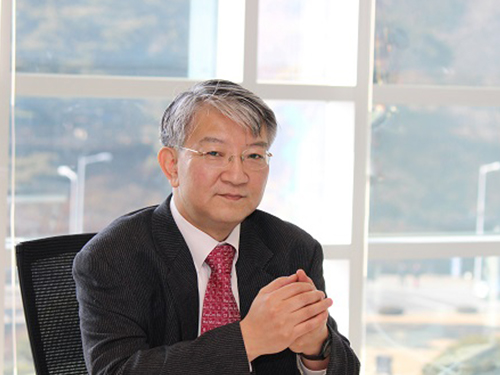 Mystery of Biological Plastic Synthesis Machinery Unveiled
Plastics and other polymers are used every day. These polymers are mostly made from fossil resources by refining petrochemicals. On the other hand, many microorganisms naturally synthesize polyesters known as polyhydroxyalkanoates (PHAs) as distinct granules inside cells.
PHAs are a family of microbial polyesters that have attracted much attention as biodegradable and biocompatible plastics and elastomers that can substitute petrochemical counterparts. There have been numerous papers and patents on gene cloning and metabolic engineering of PHA biosynthetic machineries, biochemical studies, and production of PHAs; simple Google search with “polyhydroxyalkanoates” yielded returns of 223,000 document pages. PHAs have always been considered amazing examples of biological polymer synthesis. It is astounding to see PHAs of 500 kDa to sometimes as high as 10,000 kDa can be synthesized in vivo by PHA synthase, the key polymerizing enzyme in PHA biosynthesis. They have attracted great interest in determining the crystal structure of PHA synthase over the last 30 years, but unfortunately without success. Thus, the characteristics and molecular mechanisms of PHA synthase were under a dark veil.
In two papers published back-to-back in Biotechnology Journal online on November 30, 2016, a Korean research team led by Professor Kyung-Jin Kim at Kyungpook National University and Distinguished Professor Sang Yup Lee at the Korea Advanced Institute of Science and Technology (KAIST) described the crystal structure of PHA synthase from Ralstonia eutropha, the best studied bacterium for PHA production, and reported the structural basis for the detailed molecular mechanisms of PHA biosynthesis. The crystal structure has been deposited to Protein Data Bank in February 2016. After deciphering the crystal structure of the catalytic domain of PHA synthase, in addition to other structural studies on whole enzyme and related proteins, the research team also performed experiments to elucidate the mechanisms of the enzyme reaction, validating detailed structures, enzyme engineering, and also N-terminal domain studies among others.
Through several biochemical studies based on crystal structure, the authors show that PHA synthase exists as a dimer and is divided into two distinct domains, the N-terminal domain (RePhaC1ND) and the C-terminal domain (RePhaC1CD). The RePhaC1CD catalyzes the polymerization reaction via a non-processive ping-pong mechanism using a Cys-His-Asp catalytic triad. The two catalytic sites of the RePhaC1CD dimer are positioned 33.4 Å apart, suggesting that the polymerization reaction occurs independently at each site. This study also presents the structure-based mechanisms for substrate specificities of various PHA synthases from different classes.
Professor Sang Yup Lee, who has worked on this topic for more than 20 years, said,
“The results and information presented in these two papers have long been awaited not only in the PHA community, but also metabolic engineering, bacteriology/microbiology, and in general biological sciences communities. The structural information on PHA synthase together with the recently deciphered reaction mechanisms will be valuable for understanding the detailed mechanisms of biosynthesizing this important energy/redox storage material, and also for the rational engineering of PHA synthases to produce designer bioplastics from various monomers more efficiently.”
Indeed, these two papers published in Biotechnology Journal finally reveal the 30-year mystery of machinery of biological polyester synthesis, and will serve as the essential compass in creating designer and more efficient bioplastic machineries.
References:
Jieun Kim, Yeo-Jin Kim, So Young Choi, Sang Yup Lee and Kyung-Jin Kim. “Crystal structure of Ralstonia eutropha polyhydroxyalkanoate synthase C-terminal domain and reaction mechanisms” Biotechnology Journal DOI: 10.1002/biot.201600648
http://onlinelibrary.wiley.com/doi/10.1002/biot.201600648/abstract
Yeo-Jin Kim, So Young Choi, Jieun Kim, Kyeong Sik Jin, Sang Yup Lee and Kyung-Jin Kim. “Structure and function of the N-terminal domain of Ralstonia eutropha polyhydroxyalkanoate synthase, and the proposed structure and mechanisms of the whole enzyme” Biotechnology Journal DOI: 10.1002/biot.201600649
http://onlinelibrary.wiley.com/doi/10.1002/biot.201600649/abstract
2016.12.02 View 11433
Mystery of Biological Plastic Synthesis Machinery Unveiled
Plastics and other polymers are used every day. These polymers are mostly made from fossil resources by refining petrochemicals. On the other hand, many microorganisms naturally synthesize polyesters known as polyhydroxyalkanoates (PHAs) as distinct granules inside cells.
PHAs are a family of microbial polyesters that have attracted much attention as biodegradable and biocompatible plastics and elastomers that can substitute petrochemical counterparts. There have been numerous papers and patents on gene cloning and metabolic engineering of PHA biosynthetic machineries, biochemical studies, and production of PHAs; simple Google search with “polyhydroxyalkanoates” yielded returns of 223,000 document pages. PHAs have always been considered amazing examples of biological polymer synthesis. It is astounding to see PHAs of 500 kDa to sometimes as high as 10,000 kDa can be synthesized in vivo by PHA synthase, the key polymerizing enzyme in PHA biosynthesis. They have attracted great interest in determining the crystal structure of PHA synthase over the last 30 years, but unfortunately without success. Thus, the characteristics and molecular mechanisms of PHA synthase were under a dark veil.
In two papers published back-to-back in Biotechnology Journal online on November 30, 2016, a Korean research team led by Professor Kyung-Jin Kim at Kyungpook National University and Distinguished Professor Sang Yup Lee at the Korea Advanced Institute of Science and Technology (KAIST) described the crystal structure of PHA synthase from Ralstonia eutropha, the best studied bacterium for PHA production, and reported the structural basis for the detailed molecular mechanisms of PHA biosynthesis. The crystal structure has been deposited to Protein Data Bank in February 2016. After deciphering the crystal structure of the catalytic domain of PHA synthase, in addition to other structural studies on whole enzyme and related proteins, the research team also performed experiments to elucidate the mechanisms of the enzyme reaction, validating detailed structures, enzyme engineering, and also N-terminal domain studies among others.
Through several biochemical studies based on crystal structure, the authors show that PHA synthase exists as a dimer and is divided into two distinct domains, the N-terminal domain (RePhaC1ND) and the C-terminal domain (RePhaC1CD). The RePhaC1CD catalyzes the polymerization reaction via a non-processive ping-pong mechanism using a Cys-His-Asp catalytic triad. The two catalytic sites of the RePhaC1CD dimer are positioned 33.4 Å apart, suggesting that the polymerization reaction occurs independently at each site. This study also presents the structure-based mechanisms for substrate specificities of various PHA synthases from different classes.
Professor Sang Yup Lee, who has worked on this topic for more than 20 years, said,
“The results and information presented in these two papers have long been awaited not only in the PHA community, but also metabolic engineering, bacteriology/microbiology, and in general biological sciences communities. The structural information on PHA synthase together with the recently deciphered reaction mechanisms will be valuable for understanding the detailed mechanisms of biosynthesizing this important energy/redox storage material, and also for the rational engineering of PHA synthases to produce designer bioplastics from various monomers more efficiently.”
Indeed, these two papers published in Biotechnology Journal finally reveal the 30-year mystery of machinery of biological polyester synthesis, and will serve as the essential compass in creating designer and more efficient bioplastic machineries.
References:
Jieun Kim, Yeo-Jin Kim, So Young Choi, Sang Yup Lee and Kyung-Jin Kim. “Crystal structure of Ralstonia eutropha polyhydroxyalkanoate synthase C-terminal domain and reaction mechanisms” Biotechnology Journal DOI: 10.1002/biot.201600648
http://onlinelibrary.wiley.com/doi/10.1002/biot.201600648/abstract
Yeo-Jin Kim, So Young Choi, Jieun Kim, Kyeong Sik Jin, Sang Yup Lee and Kyung-Jin Kim. “Structure and function of the N-terminal domain of Ralstonia eutropha polyhydroxyalkanoate synthase, and the proposed structure and mechanisms of the whole enzyme” Biotechnology Journal DOI: 10.1002/biot.201600649
http://onlinelibrary.wiley.com/doi/10.1002/biot.201600649/abstract
2016.12.02 View 11433 -
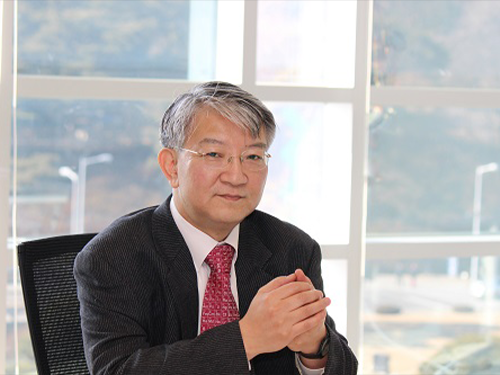 Professor Lee Co-chairs the Global Future Councils on Biotechnology of the WEF
The World Economic Forum (WEF) established a new global network of the world’s leading experts, “The Annual Meeting of the Global Future Councils,” to explore innovative solutions for the most pressing global challenges. The Councils’ first meeting took place on November 13-14, 2016, in Dubai, the United Arab Emirates (UAE). Some 25 nations joined as member states. The Councils have 35 committees.
Over 700 global leaders in business, government, civil society and academia gathered at the inaugural meeting to “develop ideas and strategies to prepare the world for the Fourth Industrial Revolution, with topics including smart cities, robotics, and the future of mobility,” according to a statement issued by the WEF.
Distinguished Professor Sang Yup Lee of Chemical and Biomolecular Engineering at KAIST was appointed to co-chair one of the Councils' committees, The Annual Meeting of the Global Future Councils on Biotechnology, for two years. The other chairperson is Dr. Feng Zhang, a professor of Biomedical Engineering at the Massachusetts Institute of Technology (MIT), who played a critical role in the development of optogenetics and CRISPR technologies.
The Biotechnology Committee consists of 24 globally recognized professionals in life sciences, law, ethics and policy including Thomas Connelly, the executive director of the American Chemical Society, Tina Fano, the executive vice president of Novozymes, and Mostafa Ronaghi, the chief technology officer of Illumina.
Professor Lee also serves as a committee member of The Annual Meeting of the Global Future Councils on the Fourth Industrial Revolution.
“Life sciences and engineering will receive more attention as a key element of the Fourth Industrial Revolution that the global society as a whole has been experiencing now. Together with thought leaders gathered worldwide, I will join the international community’s concerted efforts to address issues of importance that impact greatly on the future of humanity,” Professor Lee said.
In addition, Professor Lee received the James E. Bailey Award 2016 from The Society for Biological Engineering on November 15, 2016. He is the first Asian researcher to be recognized for his contributions to the field of biotechnology.
2016.11.15 View 10728
Professor Lee Co-chairs the Global Future Councils on Biotechnology of the WEF
The World Economic Forum (WEF) established a new global network of the world’s leading experts, “The Annual Meeting of the Global Future Councils,” to explore innovative solutions for the most pressing global challenges. The Councils’ first meeting took place on November 13-14, 2016, in Dubai, the United Arab Emirates (UAE). Some 25 nations joined as member states. The Councils have 35 committees.
Over 700 global leaders in business, government, civil society and academia gathered at the inaugural meeting to “develop ideas and strategies to prepare the world for the Fourth Industrial Revolution, with topics including smart cities, robotics, and the future of mobility,” according to a statement issued by the WEF.
Distinguished Professor Sang Yup Lee of Chemical and Biomolecular Engineering at KAIST was appointed to co-chair one of the Councils' committees, The Annual Meeting of the Global Future Councils on Biotechnology, for two years. The other chairperson is Dr. Feng Zhang, a professor of Biomedical Engineering at the Massachusetts Institute of Technology (MIT), who played a critical role in the development of optogenetics and CRISPR technologies.
The Biotechnology Committee consists of 24 globally recognized professionals in life sciences, law, ethics and policy including Thomas Connelly, the executive director of the American Chemical Society, Tina Fano, the executive vice president of Novozymes, and Mostafa Ronaghi, the chief technology officer of Illumina.
Professor Lee also serves as a committee member of The Annual Meeting of the Global Future Councils on the Fourth Industrial Revolution.
“Life sciences and engineering will receive more attention as a key element of the Fourth Industrial Revolution that the global society as a whole has been experiencing now. Together with thought leaders gathered worldwide, I will join the international community’s concerted efforts to address issues of importance that impact greatly on the future of humanity,” Professor Lee said.
In addition, Professor Lee received the James E. Bailey Award 2016 from The Society for Biological Engineering on November 15, 2016. He is the first Asian researcher to be recognized for his contributions to the field of biotechnology.
2016.11.15 View 10728 -
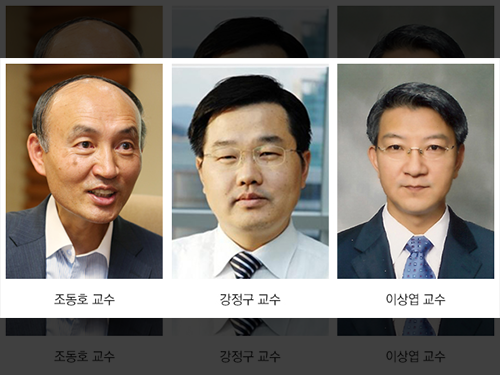 'The 2016 Top 100 Research Projects in Korea'
The Ministry of Science, ICT and Future Planning (MSIP) of Korea recently released a list of the 2016 Top 100 Research Projects in Korea. The list included the work of KAIST Professors Dong-Ho Cho of the School of Electrical Engineering, Jeung Ku Kang of the Graduate School of Energy, Environment, Water and Sustainability (EEWS), and Sang Yup Lee of the Chemical and Biomolecular Engineering Department.
Experts from academia, universities, and industries selected the 100 research projects, among 620 projects recommended by various government offices, in consideration of their contribution to the growth of science and technology in the nation.
Professor Cho conducts research on the development of 5G mobile communication systems based on the pattern polarization beam-division multiple access method.
Professor Kang works on the production of highly efficient energy materials and equipment by controlling them at the electron and atomic level.
Professor Lee focuses on the creation of strategies to produce important chemicals through a biological approach, i.e., microorganisms, which will help develop the means to mitigate climate change.
The MISP will publish a book that describes in detail each research project and will distribute copies of it to the National Assembly of Korea, libraries, and other public organizations.
For more information on the list, please go to www.ntis.go.kr.
Pictured from left to right are Professors Dong-Ho Cho, Jeung Ku Kang, and Sang Yup Lee.
2016.07.21 View 5689
'The 2016 Top 100 Research Projects in Korea'
The Ministry of Science, ICT and Future Planning (MSIP) of Korea recently released a list of the 2016 Top 100 Research Projects in Korea. The list included the work of KAIST Professors Dong-Ho Cho of the School of Electrical Engineering, Jeung Ku Kang of the Graduate School of Energy, Environment, Water and Sustainability (EEWS), and Sang Yup Lee of the Chemical and Biomolecular Engineering Department.
Experts from academia, universities, and industries selected the 100 research projects, among 620 projects recommended by various government offices, in consideration of their contribution to the growth of science and technology in the nation.
Professor Cho conducts research on the development of 5G mobile communication systems based on the pattern polarization beam-division multiple access method.
Professor Kang works on the production of highly efficient energy materials and equipment by controlling them at the electron and atomic level.
Professor Lee focuses on the creation of strategies to produce important chemicals through a biological approach, i.e., microorganisms, which will help develop the means to mitigate climate change.
The MISP will publish a book that describes in detail each research project and will distribute copies of it to the National Assembly of Korea, libraries, and other public organizations.
For more information on the list, please go to www.ntis.go.kr.
Pictured from left to right are Professors Dong-Ho Cho, Jeung Ku Kang, and Sang Yup Lee.
2016.07.21 View 5689 -
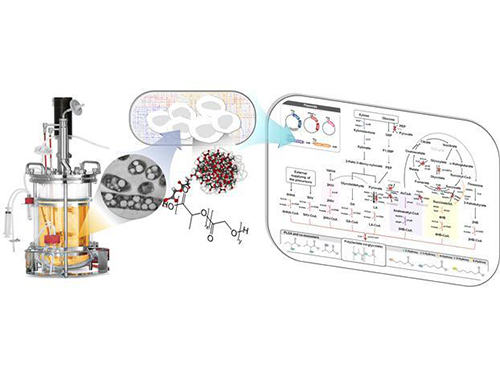 Top 10 Emerging Technologies by World Economic Forum
The World Economic Forum’s Meta-Council on Emerging Technologies announced its annual list of breakthrough technologies, the “Top 10 Emerging Technologies of 2016,” on June 23, 2016. The Meta-Council chose the top ten technologies based on the technologies’ potential to improve lives, transform industries, and safeguard the planet. The research field of systems metabolic engineering, founded by Distinguished Professor Sang Yup Lee of the Chemical and Biomolecular Engineering Department at KAIST, was also citied. Systems metabolic engineering, which combines elements of synthetic biology, systems biology, and evolutionary engineering, offers a sustainable process for the production of useful chemicals in an environmentally friendly way from plants such as inedible biomass, reducing the need of using fossil fuels. Details about the list follow below:
https://www.weforum.org/press/2016/06/battery-powered-villages-sociable-robots-rank-among-top-10-emerging-technologies-of-2016
The picture below shows the “systems metabolic engineering of E. coli for the production of PLGA." PLGA is poly(lactate-co-glycolate), which is widely used for biomedical applications, and has been made by chemical synthesis. Now it is possible to produce PLGA eco-friendly by one-step fermentation of a gut bacterium which is developed through systems metabolic engineering.
2016.06.27 View 12387
Top 10 Emerging Technologies by World Economic Forum
The World Economic Forum’s Meta-Council on Emerging Technologies announced its annual list of breakthrough technologies, the “Top 10 Emerging Technologies of 2016,” on June 23, 2016. The Meta-Council chose the top ten technologies based on the technologies’ potential to improve lives, transform industries, and safeguard the planet. The research field of systems metabolic engineering, founded by Distinguished Professor Sang Yup Lee of the Chemical and Biomolecular Engineering Department at KAIST, was also citied. Systems metabolic engineering, which combines elements of synthetic biology, systems biology, and evolutionary engineering, offers a sustainable process for the production of useful chemicals in an environmentally friendly way from plants such as inedible biomass, reducing the need of using fossil fuels. Details about the list follow below:
https://www.weforum.org/press/2016/06/battery-powered-villages-sociable-robots-rank-among-top-10-emerging-technologies-of-2016
The picture below shows the “systems metabolic engineering of E. coli for the production of PLGA." PLGA is poly(lactate-co-glycolate), which is widely used for biomedical applications, and has been made by chemical synthesis. Now it is possible to produce PLGA eco-friendly by one-step fermentation of a gut bacterium which is developed through systems metabolic engineering.
2016.06.27 View 12387 -
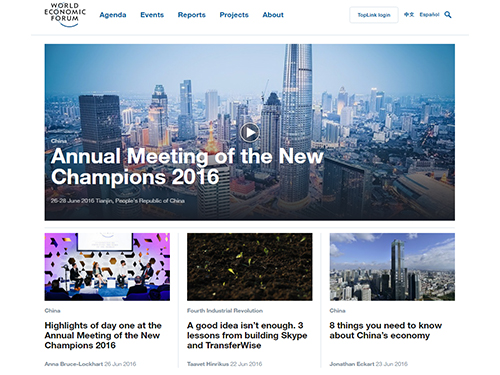 KAIST to Participate in Summer Davos Forum 2016 in China
A group of KAIST researchers will share their insights on the future and challenges of the current technological innovations impacting all aspects of society, while showcasing their research excellence in artificial intelligence and robotics.
Scientific and technological breakthroughs are more important than ever as key agents to drive social, economic, and political changes and advancements in today’s world. The World Economic Forum (WEF), an international organization that provides one of the broadest engagement platforms to address issues of major concern to the global community, will discuss the effects of these breakthroughs at its 10th Annual Meeting of the New Champions, a.k.a., the Summer Davos Forum, in Tianjin, China, June 26-28, 2016.
Three professors from the Korea Advanced Institute of Science and Technology (KAIST) will join the Annual Meeting and offer their expertise in the fields of biotechnology, artificial intelligence, and robotics to explore the conference theme, “The Fourth Industrial Revolution and Its Transformational Impact.” The Fourth Industrial Revolution, a term coined by WEF founder, Klaus Schwab, is characterized by a range of new technologies that fuse the physical, digital, and biological worlds, such as the Internet of Things, cloud computing, and automation.
Distinguished Professor Sang Yup Lee of the Chemical and Biomolecular Engineering Department will speak at the Experts Reception to be held on June 25, 2016 on the topic of “The Summer Davos Forum and Science and Technology in Asia.” On June 27, 2016, he will participate in two separate discussion sessions.
In the first session entitled “What If Drugs Are Printed from the Internet?,” Professor Lee will discuss the impacts of advancements in biotechnology and 3D printing technology on the future of medicine with Nita A. Farahany, a Duke University professor. Clare Matterson, the Director of Strategy at Wellcome Trust in the United Kingdom, will serve as the moderator. The discussants will note recent developments made in the way patients receive their medicine, for example, downloading drugs directly from the internet and the production of yeast strains to make opioids for pain treatment through systems metabolic engineering. They will also suggest how these emerging technologies will transform the landscape of the pharmaceutical industry in the years to come.
In the second session, “Lessons for Life,” Professor Lee will talk about how to nurture life-long learning and creativity to support personal and professional growth necessary in an era of the new industrial revolution.
During the Annual Meeting, Professors Jong-Hwan Kim of the Electrical Engineering School and David Hyunchul Shim of the Aerospace Department will host, together with researchers from Carnegie Mellon University and AnthroTronix, an engineering research and development company, a technological exhibition on robotics. Professor Kim, the founder of the internally renowned Robot World Cup, will showcase his humanoid soccer-playing micro-robots and display their various cutting-edge technologies such as imaging processing, artificial intelligence, walking, and balancing. Professor Shim will present a human-like robotic piloting system, PIBOT, which autonomously operates a simulated flight program by employing control sticks and guiding an airplane from takeoff to landing.
In addition, the two professors will join Professor Lee, who is also a moderator, to host a KAIST-led session on June 26, 2016, entitled “Science in Depth: From Deep Learning to Autonomous Machines.” Professors Kim and Shim will explore new opportunities and challenges in their fields from machine learning to autonomous robotics, including unmanned vehicles and drones.
Since 2011, KAIST has participated in the World Economic Forum’s two flagship conferences, the January and June Davos Forums, to introduce outstanding talents, share their latest research achievements, and interact with global leaders.
KAIST President Steve Kang said, “It is important for KAIST to be involved in global forums that identify issues critical to humanity and seek answers to solve them, and where our skills and knowledge in science and technology can play a meaningful role. The Annual Meeting in China will become another venue to accomplish this.”
2016.06.27 View 13899
KAIST to Participate in Summer Davos Forum 2016 in China
A group of KAIST researchers will share their insights on the future and challenges of the current technological innovations impacting all aspects of society, while showcasing their research excellence in artificial intelligence and robotics.
Scientific and technological breakthroughs are more important than ever as key agents to drive social, economic, and political changes and advancements in today’s world. The World Economic Forum (WEF), an international organization that provides one of the broadest engagement platforms to address issues of major concern to the global community, will discuss the effects of these breakthroughs at its 10th Annual Meeting of the New Champions, a.k.a., the Summer Davos Forum, in Tianjin, China, June 26-28, 2016.
Three professors from the Korea Advanced Institute of Science and Technology (KAIST) will join the Annual Meeting and offer their expertise in the fields of biotechnology, artificial intelligence, and robotics to explore the conference theme, “The Fourth Industrial Revolution and Its Transformational Impact.” The Fourth Industrial Revolution, a term coined by WEF founder, Klaus Schwab, is characterized by a range of new technologies that fuse the physical, digital, and biological worlds, such as the Internet of Things, cloud computing, and automation.
Distinguished Professor Sang Yup Lee of the Chemical and Biomolecular Engineering Department will speak at the Experts Reception to be held on June 25, 2016 on the topic of “The Summer Davos Forum and Science and Technology in Asia.” On June 27, 2016, he will participate in two separate discussion sessions.
In the first session entitled “What If Drugs Are Printed from the Internet?,” Professor Lee will discuss the impacts of advancements in biotechnology and 3D printing technology on the future of medicine with Nita A. Farahany, a Duke University professor. Clare Matterson, the Director of Strategy at Wellcome Trust in the United Kingdom, will serve as the moderator. The discussants will note recent developments made in the way patients receive their medicine, for example, downloading drugs directly from the internet and the production of yeast strains to make opioids for pain treatment through systems metabolic engineering. They will also suggest how these emerging technologies will transform the landscape of the pharmaceutical industry in the years to come.
In the second session, “Lessons for Life,” Professor Lee will talk about how to nurture life-long learning and creativity to support personal and professional growth necessary in an era of the new industrial revolution.
During the Annual Meeting, Professors Jong-Hwan Kim of the Electrical Engineering School and David Hyunchul Shim of the Aerospace Department will host, together with researchers from Carnegie Mellon University and AnthroTronix, an engineering research and development company, a technological exhibition on robotics. Professor Kim, the founder of the internally renowned Robot World Cup, will showcase his humanoid soccer-playing micro-robots and display their various cutting-edge technologies such as imaging processing, artificial intelligence, walking, and balancing. Professor Shim will present a human-like robotic piloting system, PIBOT, which autonomously operates a simulated flight program by employing control sticks and guiding an airplane from takeoff to landing.
In addition, the two professors will join Professor Lee, who is also a moderator, to host a KAIST-led session on June 26, 2016, entitled “Science in Depth: From Deep Learning to Autonomous Machines.” Professors Kim and Shim will explore new opportunities and challenges in their fields from machine learning to autonomous robotics, including unmanned vehicles and drones.
Since 2011, KAIST has participated in the World Economic Forum’s two flagship conferences, the January and June Davos Forums, to introduce outstanding talents, share their latest research achievements, and interact with global leaders.
KAIST President Steve Kang said, “It is important for KAIST to be involved in global forums that identify issues critical to humanity and seek answers to solve them, and where our skills and knowledge in science and technology can play a meaningful role. The Annual Meeting in China will become another venue to accomplish this.”
2016.06.27 View 13899